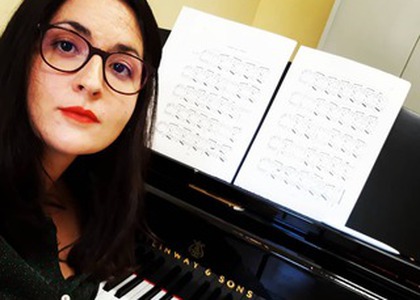> [Archived] Interviews

Interview with composer Carmen Fizzarotti
Carmen Fizzarotti, on Wednesday there's going to be an event from within the project called "The Uncertain Four Seasons". I would like you to tell us how did this project come to be and what are its main objectives.
This project was born from a group of scientists and composers who wanted to draw attention on the issue of global warming. This thing was achieved through the reinvention of Vivaldi's "Four Seasons". How did this process went? Well, they designed an algorithm that modifies the music sheet, using the geospatial prediction from 2050, under the premise that humanity will not reverse the effects of the global warming. So, the main question is "what kind of music would have Vivaldi composed, if the world looked different than it is now, and which seasons would have been expressed through his music".
The compositional process changes the consonant interval to a dissonant inverval, and my job was to create a new landscape for each season, which was based on the cities included on the EUYO tournament's map. The series of events has begun on May 15th in Poland and today, May 17th it reaches Timișoara. It will then continue with Skopje and Thessaloniki, amongst others. Therefore, my task was that of creating a new atmosphere for Vivaldi's music, thus transforming it to a music that fits the reality nowadays. Because we have to be aware that if we don't start taking the necessary attitude towards the problems that out planet faces, they will eventually escalate. And this thing is not so hard to do. A human characteristic is the impossibility to imagine the future due to the limited time that we spend here on this planet.
The main objective of the concert in Timisoara is to raise awareness of the consquences of global warming in Romania. I've discussed with a lot of friends of mine, who are living in your country, and they told me that there lacks a good understanding of the phenomenon.
How would you describe the collaboration with Hugh Crosthwaite, Akqa and JVM?
I think that their goal is a very strong and important one for 2023, even though the project was initiated a few years ago. The goal of the project is very bold and includes 14 big orchestras from around the world. We've actually started in Venice, in 2021, and then we've decided to promote this idea in each of the four seasons. For this tournament we're in collaboration with the European Union Youth Orchestra (EUYO).
My relationship with Hugh Costhwaite and the team who developed the algorithm for me, has entailed the modification of the music sheet and coming up with a new language and a new scheme in which to combine the algorithm with Vivaldi's music and my own compositional concept. I consider the musical work a living organism and this task was a very challenging one for me.
What do you consider to be the role of the artist, precisely the one of the composers and their music in the social manifestations of today?
Well, this is truly a major question, because the artist is and always was a strange character in the world. They have the role of making predictions for the future, having a superior sensitiveness that is greater than the ones around them I would like to quote master Krzysztof Penderecki, a quote in which he describes exactly the way I view the mission of a composer. He said: "A composer uses the sounds for writing an autobiography, an exhibition of the Self and Time in which they lived. He is an observer and an active participant in this world, an observer of a complex reality". I found this words enlightning for the purpose of the composer in today's world. We write music, but we need interpreters to deliver out art to the public, but the goal founds itself always at the border between what the composer writes and what is received by the public, but the aim is to convey a message through our music, whether it reaches or not to the public. If we desire to send a message from our soul, we have to communicate it very well for it to happen.
Translated by Georgiana Morozii,
University of Bucharest, Faculty of Foreign Languages and Literatures, MTTLC, year I
Corrected by Silvia Petrescu














